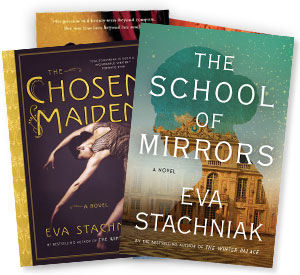The latest guest blog I wrote for Writing Historical Novels.
The women of the Age of Reason have captured my imagination. Their voices sound much closer to our contemporary sensibilities than the voices of their daughters and grand-daughters. For starters, they are not coy about their sexuality. The eighteenth century women would’ve found the Victorian ideal of a woman as “angel of the house” separated from the desires of the flesh odd or even preposterous. Many among them, especially if they had the luck of being born or married into aristocratic families, claimed an active role in the misogynous male world and were quite successful in their endeavours.
I am particularly interested in the women of Russian nobility. It was Peter the Great (1682-1725) who forcibly removed them from their secluded position inside the home (terem), brought them into salons, dressed them in Western clothes and fostered their participation in the social life. Suddenly they found themselves obliged to entertain guests, conduct conversations with men who were not their husbands or relatives, and appear in public at various court functions. These were not popular measures. The majority of the Russian society took to them with fear and reluctance. There was talk of shamelessness, of the decline of morals and of the dangers to the soul, but by the time Catherine the Great ascended to the throne in 1762 Russian ‘elite’ women were well used to their new freedoms.
Having left their domestic seclusion, the Russian women began to take an active role in Russian life. It helped that in the eighteenth century Russia enjoyed a sequence of female rulers: Peter the Great’s wife succeeded him as Empress Catherine I. Later and his youngest daughter ruled Russia from 1742-61 as Empress Elizabeth Petrovna. Then came the thirty-four year long rule of Catherine the Great.
In Catherinian Russia, women were a fixture of the court and public life. They actively participated in all court events, threw themselves into charitable work, founded and cared for educational institutions, and ran their estates. They enjoyed more property rights than Western women and their growing confidence brought spectacular results. Princess Ekaterina Dashkova who thought herself Catherine the Great’s best friend, perhaps with too much self-confidence, can serve as an example. Widowed early in life, she never re-married. She not only became an active and very successful manager of her own estates but also became Director of the Russian Imperial Academy of Sciences in St. Petersburg, the first woman in the world to lead a national science academy. She was also a founder of the Imperial Academy of the Russian Language which in the years 1789–1794 was engaged in compiling the six-volume Academic Dictionary of the Russian Language.
What did foreign visitors to Russia make of this new confidence of the Russian noblewomen? Through my research for The Winter Palace, I found out that many Western men found the Russian women too confident, too free and too independent. Charles Masson, in his Secret Memoirs of the Court of Petersburg, chastises them as being unnatural and masculine, and of “assuming superiority over men”. Western women were far more impressed by what they saw. As Princess Dashkova’s Irish house guest, Martha Wilmot, put it: “Russian women enjoy more rights and more independence than the women of the West.”

Polish Language Site